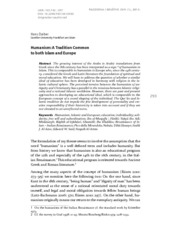Humanism: A Tradition Common to both Islam and Europe
Humanizam: zajednička tradicija islama i Evrope
Апстракт
The growing interest of the Arabs in Arabic translations from Greek since the 8th century has been interpreted as a sign of humanism in Islam. This is comparable to humanists in Europe who, since the 14th century, considered the Greek and Latin literature the foundation of spiritual and moral education. We will have to address the question of whether a similar ideal of education has been developed in harmony with religion in the Islamic cultural sphere. The perceived tension between the humanists of antiquity and Christianity has a parallel in the tensions between Islamic religiosity and a rational Islamic worldview. However, there are past and present approaches to developing an educational ideal, which is comparable to the European concept of a moral shaping of the individual. The Qur’ān and Islamic tradition do not impede the free development of personality and creative responsibility if their historicity is taken into account and if they are not elevated to an unreflected norm.
Извор:
Filozofija i društvo/Philosophy and Society, 2013, 293-310Институција/група
IFDTTY - JOUR AU - Daiber, Hans PY - 2013 UR - http://rifdt.instifdt.bg.ac.rs/123456789/1032 AB - The growing interest of the Arabs in Arabic translations from Greek since the 8th century has been interpreted as a sign of humanism in Islam. This is comparable to humanists in Europe who, since the 14th century, considered the Greek and Latin literature the foundation of spiritual and moral education. We will have to address the question of whether a similar ideal of education has been developed in harmony with religion in the Islamic cultural sphere. The perceived tension between the humanists of antiquity and Christianity has a parallel in the tensions between Islamic religiosity and a rational Islamic worldview. However, there are past and present approaches to developing an educational ideal, which is comparable to the European concept of a moral shaping of the individual. The Qur’ān and Islamic tradition do not impede the free development of personality and creative responsibility if their historicity is taken into account and if they are not elevated to an unreflected norm. T2 - Filozofija i društvo/Philosophy and Society T1 - Humanism: A Tradition Common to both Islam and Europe T1 - Humanizam: zajednička tradicija islama i Evrope SP - 293 EP - 310 DO - 10.2298/FID1301293D ER -
@article{
author = "Daiber, Hans",
year = "2013",
abstract = "The growing interest of the Arabs in Arabic translations from Greek since the 8th century has been interpreted as a sign of humanism in Islam. This is comparable to humanists in Europe who, since the 14th century, considered the Greek and Latin literature the foundation of spiritual and moral education. We will have to address the question of whether a similar ideal of education has been developed in harmony with religion in the Islamic cultural sphere. The perceived tension between the humanists of antiquity and Christianity has a parallel in the tensions between Islamic religiosity and a rational Islamic worldview. However, there are past and present approaches to developing an educational ideal, which is comparable to the European concept of a moral shaping of the individual. The Qur’ān and Islamic tradition do not impede the free development of personality and creative responsibility if their historicity is taken into account and if they are not elevated to an unreflected norm.",
journal = "Filozofija i društvo/Philosophy and Society",
title = "Humanism: A Tradition Common to both Islam and Europe, Humanizam: zajednička tradicija islama i Evrope",
pages = "293-310",
doi = "10.2298/FID1301293D"
}
Daiber, H.. (2013). Humanism: A Tradition Common to both Islam and Europe. in Filozofija i društvo/Philosophy and Society, 293-310. https://doi.org/10.2298/FID1301293D
Daiber H. Humanism: A Tradition Common to both Islam and Europe. in Filozofija i društvo/Philosophy and Society. 2013;:293-310. doi:10.2298/FID1301293D .
Daiber, Hans, "Humanism: A Tradition Common to both Islam and Europe" in Filozofija i društvo/Philosophy and Society (2013):293-310, https://doi.org/10.2298/FID1301293D . .


